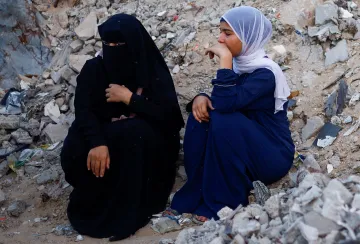Gaza: While Muslims around the world celebrated the Islamic holiday of Eid al-Adha with feasting and gifts on Sunday, displaced Palestinians in the Gaza Strip struggled to feed their families. Several displaced women in Deir al-Balah, in central Gaza, spoke about how Eid drastically changed for them compared to last year due to the devastating war between Israel and Hamas. “There are no new clothes, no Eid meat, or even Eid sweets, and you can't give your son a toy to make him happy like before," said Nadia Al-Debis, a displaced mother from Gaza City.
"Family can’t even afford to buy the basic necessities"
Her sister, Aya Al-Debis, said Eid would be marked by the absence of loved ones. "We are suffering from missing our family, my husband. And the children are missing their father." Her family can’t even afford to buy the basic necessities like healthy food for her children, she added. “We... fled from the hunger that was in the north. We were forced because the children could not bear it,” she added.
71-year-old mother and grandmother Samira Masran, displaced from Gaza city, is spending Eid with two of her daughters and son who are currently residing with her at the UNRWA-funded school in Khan Younis. Samira's four other sons and daughters are staying elsewhere with their families. “The (war) planes haven’t stopped… Where’s the Eid?” Masran, who had a 25-member family, said.
“My children used to come in the morning to celebrate Eid with me, my grandchildren and daughters-in-law would come so we can gather in Eid, eat nuts and desserts in our home,” Masran added, as she reminisced about past festivals.
"How come you’re speaking about Eid"
Raneen, her 26-year-old daughter, prepared food for her family, frying eggplant and potatoes. With tearful eyes, she said that losing her house made her feel insecure and unable to celebrate. "How come you’re speaking about Eid, while every day we have martyrs and dead people and our land is soaked with blood, what Eid is that?" she said.
Meanwhile, Um Fadi Shonnar, who was displaced from Beit Lahia in north Gaza, said that the war must end for the sake of their children. “Our homes are gone, and we are psychologically and financially destroyed,” she said as she sat with her children inside a tent. “We live in tents. The epidemic, poverty and hunger have wiped us out. We, as adults, are tired, so what about the children?” she asked.
Earlier on Sunday, Israel's military announced on that it would pause fighting during daytime hours along a route in southern Gaza to free up a backlog of humanitarian aid deliveries. The military said that the pause, which begins on the first day of Eid Al-Adha holiday, came after discussions with the United Nations and other aid agencies. Hamas killed around 1,200 people during its October 7 attack and took 250 hostage, Israeli authorities say. Health officials in Hamas-run Gaza say more than 37,000 Palestinians have been killed.
(With inputs from agencies)
Also Read: 'We put our lives in danger, but...': Gaza residents resort to eating mallow plant amid food shortages I VIDEO
Latest World News
